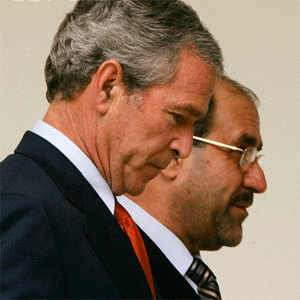A New Challenge for Iraq: Baghdad-Washington Security Pact

The Baghdad-Washington security pact that guarantees long-term stay of American troops in Iraq has turned into a serious challenge in this Arab country these days, one which -beside the Iraqi nation- has caused concerns within other countries of the region. Arab countries, especially Saudi Arabia and Egypt, who were awaiting U.S. withdrawal by the end of 2008, are now facing a new situation that will put all their dreams in flames.
By the virtue of UN resolution approved at the time of U.S. attack on Iran, American troops would stay in Iraq by the end of 2008. Cunningly, France had convinced U.S. to accept its position as an occupier.
There are two issues that agitate the Arab countries: first, they fear if U.S. presence in Iraq exceeds that of its presence in their countries [consequently giving Iraq a primary position in U.S. Middle Eastern agenda]. Secondly, full control over Iraq’s security and military affairs keeps Iraq out of Arab League and the Arab world’s sphere of influence and decision, which is no good news for Arabs.
Neighboring countries, particularly Iran and Syria, are quiet concerned over presence of a hostile country at their borders. Iranians regard the United States as an unforgivable enemy who is constantly conspiring to topple the Islamic regime. United States’ increasingly threatening policies compound the sentiment. For Iranians, Americans in Iraq is tantamount to ‘enemy behind the gates’.
Syrians share this feeling with Iranians. In general, U.S. occupation of Iraq and the subsequent rhetoric calling Iraq the first step towards a new Middle East and spreading democracy to all countries of the region, has made most of the Middle Eastern countries (if not all) suspicious to United States. They regard U.S. as an enemy who will undermine their stability whenever it finds the circumstances appropriate. This is the major reason for regional opposition to U.S. Army’s further remaining in Iraq. All countries are using pre-emptive tools to block U.S. long-term presence in Iraq.
Inside Iraq it’s the same story. The schism over the security pact is increasingly widening. One cause is lack of information about the pact. Neither the Iraqis nor the Americans have revealed contents of the security pact and this has escalated suspicion among Iraqi political groups.
Most oppositions rise from groups and parties who have been directly repressed by the Americans. The Sadr movement –who was severely wounded by Nouri Maleki and America a few months ago- has shown the fiercest opposition. Rejecting long-term security pact with United States, the Sadr movement asked other political groups to denounce the agreement. Falah Shenshel, a leader of the Sadr movement, has pointed out various problems with the pact, including legislative immunity of American citizens. Shenshel adds: “we must learn a lesson from countries like Japan and Germany who have signed similar pacts with America. They are still paying a price”.
Ebrahim Ja’fari, former Iraqi PM, who has always backed Sadr movement’s stances, has also criticized the Iraq-U.S. security pact calling the terms of the agreement humiliating.
But in his last visit with George Bush, Maleki signed the draft of agreement on U.S. long-term presence in Iraq. The move provoked protests among Iraqi groups, especially the Sadr movement at that time.
As it was said, details of the controversial pact are unknown yet, but some news resources like al-Hayat daily newspaper have disclosed some clauses of the pact, such as establishment of 400 military centers and legislative immunity for American citizens and soldiers. The Iraqi government and Iraqi officials haven’t acknowledged anything yet.
There are also rumors that U.S. is going to build its largest embassy in Baghdad and it is going to establish consulates in all provinces of Iraq. Ten thousand staffs are going to move to the country to run the consulates. Of course the plan has not entered the operational phase yet.
Meanwhile, Ali Dabbagh -Maleki’s spokesman- says that the pact is still at its initial phases. According to Dabbagh: “Iraq stresses its full sovereignty and agreement over the pact may be achieved by the end of the [Christian] year”. He added that the Iraqi government is serious to keep its control over land, coastal, and air sovereignty and its foreign and domestic affairs and it will accept no clause in the agreement which would violate the Iraqi sovereignty and interests. Dabbagh stated that there are considerable differences among American and Iraqi officials and it’s too early to talk about signing the pact. Earlier it was said that the security pact will be signed at the end of July, which is nearly one month from now.
Meanwhile, Iraqis’ religious leader, Grand Ayatollah Ali Sistani, released a statement announcing his opposition to the security pact. Ahmad al-Safee, Ayatollah Sistani’s representative in Karbala, believes that the security pact violates Iraq’s sovereignty and brings unnecessary commitments for the Iraqi nation. Other religious leaders have also expressed their concerns over the agreement.
However, opposing the pact isn’t restricted to Shiites. Sunnis and other Iraqi sects adopted a similar stance. Muhi Majid al-Ghanem, member of the Iraqi Assembly of Ulama, South Branch, has also expressed his party’s opposition to signing this pact: “by signing the agreement, United States drains Iraq’s legitimacy and sovereignty and makes itself the owner of everything in Iraq. The pact violates Iraq’s sovereignty and drops the country under U.S. control, so for a long time they can do whatever they want”.
Al-Ghanem added: “we demand Iraq’s unity and will never agree with this pact, because [we know] U.S. is suffering oil shortage and it is aware of its dependence on this source of energy. We demand unconditional withdrawal of occupiers and their allies because our country inherits an old civilization and Islamic heritage”. Al-Ghanem stressed Sunni clerics’ definite opposition to the security pact since it harms the Iraqi nation’s dignity and the unity between Muslims, Kurds and Turkmens.
Meanwhile, the Iraqi parliament is going to summon FM Hoshyar Zebari and the negotiating team to investigate the case. Also, Muqtada Sadr’s supporters have called for a national referendum on the long-term security pact with the United States. U.S. Ambassador has seriously opposed this plan. Ryan Crocker has also informed the Iraqi officials about his country’s wish to discuss establishing permanent military bases in Iraq.
About this controversial agreement New York Times writes: “some senior Iraqi political leaders said they had serious concerns over the central issues under negotiation, including what sort of military operations and arrests of Iraqis the American troops could carry out without Iraq’s permission, legal immunities sought for American troops and security contractors and what the Iraqi officials characterized as demands for a long-term American military presence” (May 31 2008).
Many Iraqi officials consider long-term presence of U.S. troops in Iraq demeaning and point to political dangers of this security pact for Maleki’s government. Those against the pact are not limited to Sadr movement and even some members of the Supreme Council for the Islamic Revolution in Iraq (SCIRI), who is Maleki’s ally, have announced that several parts of the agreement violate Iraq’s sovereignty.
SCIRI’s official spokesman and head of the political affairs has set four conditions to agree with Baghdad-Washington security pact:
Speaking to Asharq Alawsat, Reza Jawad Taqi stated: “the Supreme Council for the Islamic Revolution in Iraq does not fully reject Baghdad-Washington long-term cooperation but demands compliance to four conditions”. These conditions, according to Jawad Taqi, are considering Iraq as an independent, sovereign country, transparency of the course of negotiations and informing the Iraqi nation and countries of the region about the contents of the agreement, consensus between all Iraqis on the pact and not using the Iraqi territory for attacking other countries, since the Iraqi nation doesn’t want to become a base from which neighbors or other countries in the region are damaged.
Also Abdul-Aziz Hakim, leader of the SCIRI and head of the United Iraqi Alliance in the parliament remarked: “the running negotiations have not reached a result. [And] there is a national opposition against many clauses proposed by the United States in this agreement which violate Iraq’s sovereignty”. Hakim asked all Iraqis to remain patient and avoid accusing each other. He also added: “from the beginning we have constantly emphasized non-violation of Iraq’s sovereignty in all agreements. We have stated that the negotiations must be transparent and the Iraqis must know about all the clauses and details of the pact since it relates to their present and future”.


نظر شما :